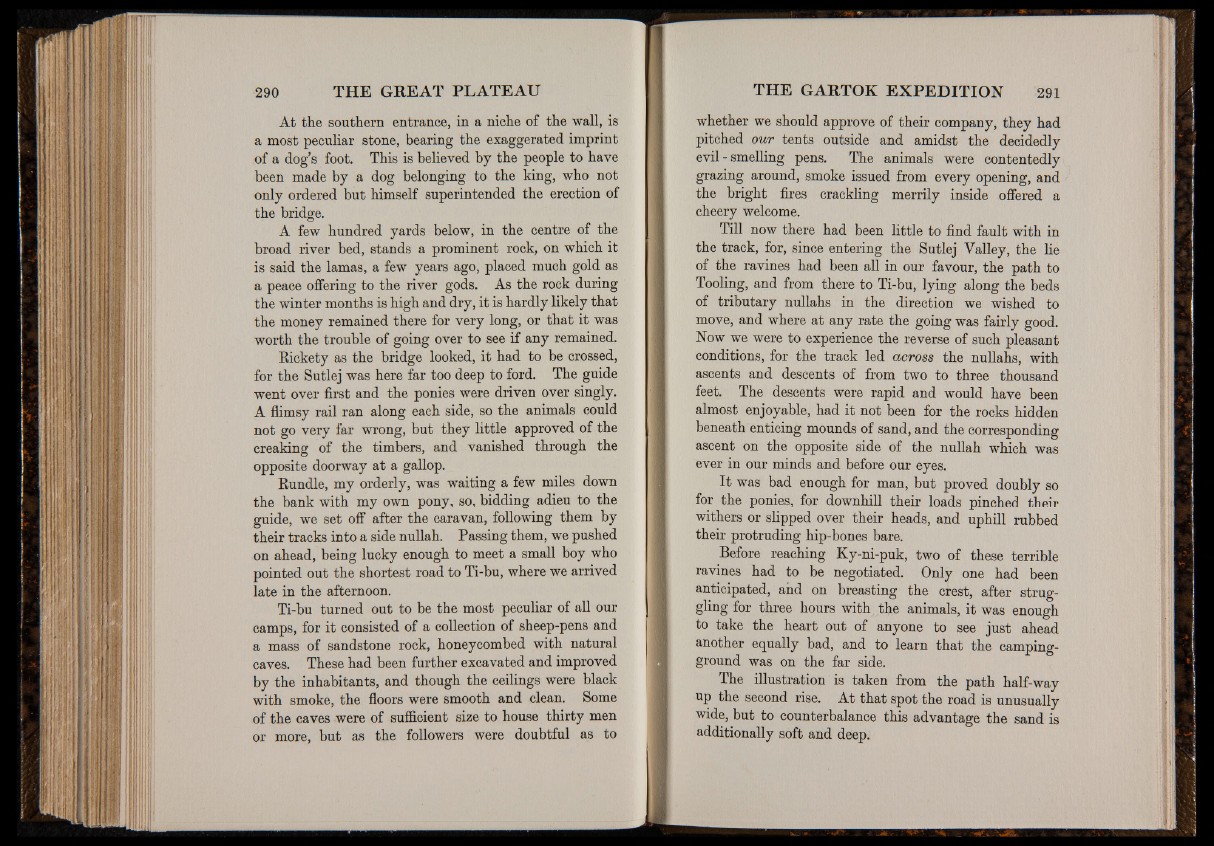
At the southern entrance, in a niche of the wall, is
a most peculiar stone, bearing the exaggerated imprint
of a dog’s foot. This is believed by the people to have
been made by a dog belonging to the king, who not
only ordered but himself superintended the erection of
the bridge.
A few hundred yards below, in the centre of the
broad river bed, stands a prominent rock, on which it
is said the lamas, a few years ago, placed much gold as
a peace offering to the river gods. As the rock during
the winter months is high and dry, it is hardly likely that
the money remained there for very long, or that it was
worth the trouble of going over to see if any remained.
Rickety as the bridge looked, it had to be crossed,
for the Sutlej was here far too deep to ford. The guide
went over first and the ponies were driven over singly.
A flimsy rail ran along each side, so the animals could
not go very far wrong, but they little approved of the
creaking of the timbers, and vanished through the
opposite doorway at a gallop.
Rundle, my orderly, was waiting a few miles down
the bank with my own pony, so, bidding adieu to the
guide, we set off after the caravan, following them by
their tracks into a side nullah. Passing them, we pushed
on ahead, being lucky enough to meet a small boy who
pointed out the shortest road to Ti-bu, where we arrived
late in the afternoon.
Ti-bu turned out to be the most peculiar of all our
camps, for it consisted of a collection of sheep-pens and
a mass of sandstone rock, honeycombed with natural
caves. These had been further excavated and improved
by the inhabitants, and though the ceilings were black
with smoke, the floors were smooth and clean. Some
of the caves were of sufficient size to house thirty men
or more, but as the followers were doubtful as to
whether we should approve of their company, they had
pitched our tents outside and amidst the decidedly
evil - smelling pens. The animals were contentedly
grazing around, smoke issued from every opening, and
the bright fires crackling merrily inside offered a
cheery welcome.
Till now there had been little to find fault with in
the track, for, since entering the Sutlej Valley, the lie
of the ravines had been all in our favour, the path to
Tooling, and from there to Ti-bu, lying along the beds
of tributary nullahs in the direction we wished to
move, and where at any rate the going was fairly good.
Now we were to experience the reverse of such pleasant
conditions, for the track led across the nullahs, with
ascents and descents of from two to three thousand
feet. The descents were rapid and would have been
almost enjoyable, had it not been for the rocks hidden
beneath enticing mounds of sand, and the corresponding
ascent on the opposite side of the nullah which was
ever in our minds and before our eyes.
It was bad enough for man, but proved doubly so
for the ponies, for downhill their loads pinched their
withers or slipped over their heads, and uphill rubbed
their protruding hip-bones bare.
Before reaching Ky-ni-puk, two of these terrible
ravines had to be negotiated. Only one had been
anticipated, and on breasting the crest, after struggling
for three hours with the animals, it was enough
to take the heart out of anyone to see just ahead
another equally bad, and to learn that the camping-
ground was on the far side.
The illustration is taken from the path half-way
up the second rise. At that spot the road is unusually
wide, but to counterbalance this advantage the sand is
additionally soft and deep.